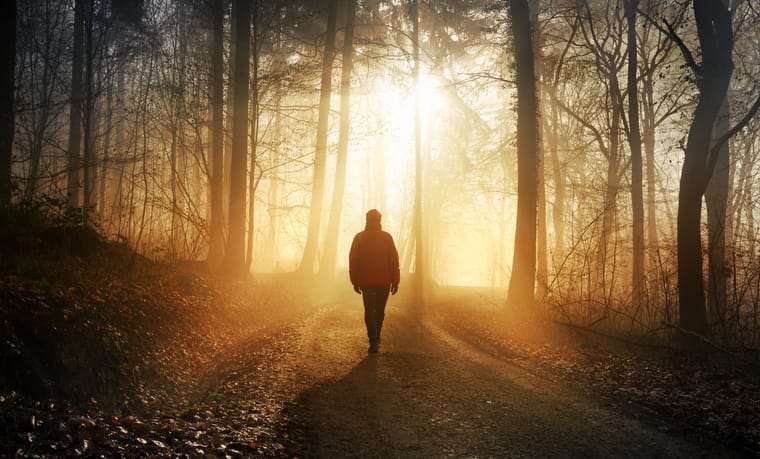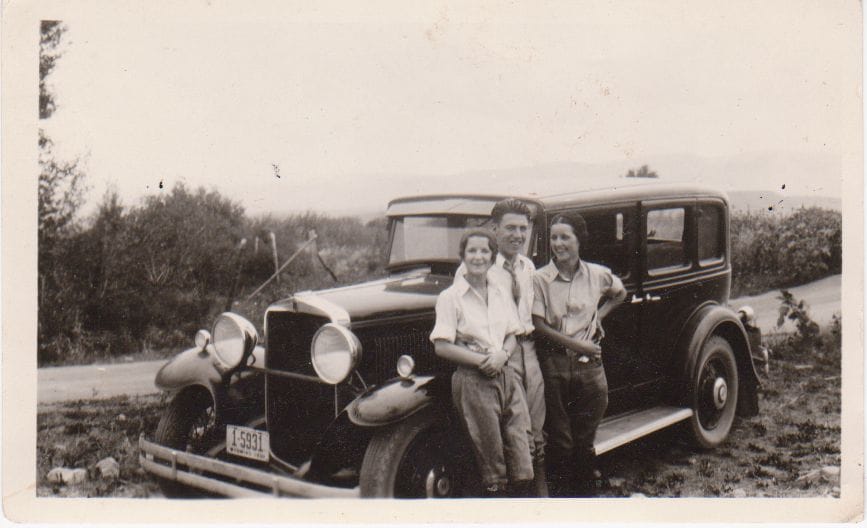"The World Reveals Itself to Those Who Walk"

I walk a lot. I mean, I'm a New Yorker now, and here we walk significantly more than other Americans elsewhere do (which isn't necessarily saying much as Americans in general walk very little -- far far less than the residents in other industrialized countries).
Poppy and I walk Kin to his office every weekday morning, which means I've hit that mythical mark of 10,000 steps before 9am, Monday thru Friday -- before I’ve worked or “worked out.”
I don't drive — I stopped driving a while ago, not because we moved to Manhattan but because I simply don't like it. My eyesight's terrible; I can't see well enough, I tell myself. I'll take the bus or subway sometimes, sure, particularly if the weather is terrible, but most of the time, for almost all of my chores and outings, I'll just walk. It’s not that it’s the easiest way or even the fastest way to get somewhere; I simply prefer it.
The world reveals itself to those who walk
— Werner Herzog
Walking is how I get to know a place, it’s how I know a place. Yes, I could look at a map. Yes, I could ride the bus (take a cab, drive a car, whatever) with a similar purpose in mind. I could look out the vehicle’s window and see where I’m headed — if you are driving, your eyes had better be on the fucking road though. But there's something about the pace with which I move while walking that allows me to see more, to process more. When I run or ride, I’m moving too quickly (even if I’m not moving all that quickly); my surroundings are a blur – not from speed so much as from cognition.
Walking lets you read the world — and much like the slow, contemplative mental processes involved in reading a book, the pace with which one moves through the world while walking allows for a different, deliberative kind of seeing. You notice more. You think more.
I come from a family of walkers.
Wait no, that's not true.
On my dad's side of the family, I come from people who embraced the automobile in its earliest days and refused to walk anywhere ever again.

When I was very young, I did walk home from elementary school, wind permitting, and I spent a fair amount of my childhood roaming the neighborhood on my bike. But most of the time, even for the shortest of trips and closest of destinations, I got there by car. I learned to drive the minute I was old enough to do so. I drove to high school — literally two blocks from home.
My friends and family and I – yikes, how awful – would mock the "mall walkers," those older men and women who'd head to the town’s indoor shopping centers and malls and power-walk back and forth along the concourses. (We teens would drive to the mall to “hang out” – that is, to sit, to watch, to be seen, which in hindsight seems just as daft.)
Blame the geography, blame the weather, blame the culture — walking was just not something I did much of growing up.
...Except when we were in England, visiting my mom's side of family. The British are walkers. There we'd walk to the shops, walk to the post. We’d walk for the sake of walking, ambling through fields and woods and gardens and parks — through other people's property, which even without knowing all the legal intricacies, I recognized I could never do back home.
My granny was part of a social walking club, and well into her eighties would partake in lengthy walking tours, bussing up to Scotland or over to Cornwall just to walk for a whole day. This was mind-boggling to teenage me, but sounds quite idyllic to old me now. At the time, I was convinced that the allure of these tours must've been that she and her friends would end up at a pub. Now I recognize that it wasn’t (just) the half pint of cider and Ploughman's lunch; it was the walking itself she loved.
Walking kept her fit, physically and mentally, to be sure — that's the easy and obvious rationale, isn't it. That's what often gets invoked in making the case for walking more: it's good for your health, a corrective to our increasingly sedentary lives.
(Of course, someone's bound to chime in that walking is insufficient exercise — that is, you're likely not walking fast enough for it to be strenuous enough to count towards the 150 minutes of moderate intensity aerobic exercise we're supposed to get each week. Ugh. Whatever.)
The world reveals itself to those who walk. Moving slowly means moving thoughtfully, purposefully. Aware -- aware of the world around you, aware of the thoughts on your head.
I first noticed it almost a decade ago, in Australia of all places — perhaps the only industrialized nation whose inhabitants walk less than those in the States: all along the sidewalks of Sydney, folks had their eyes glued to their phones as they walked. Now, I see this everywhere. I’m not talking about that quick glance we all take to check Google maps — am I heading in the right direction? I often can't tell when I emerge from the subway — or to flip to the next song on the playlist, or to see who just texted. I’m talking about a complete commitment to what's on the screen. Transfixed, utterly transfixed. Eyes down, but moving forward.
We used to joke that watching television turned people into zombies – staring, drooling, mindless. But those zombies sat still – eyes on the TV set, stuck to their seats on the sofa. Now, these zombies are up and moving; they’re ambling down the street — across the street even — with their eyes barely leaving their phones to look up, look around.
And it is television they’re watching. Or rather, it’s a string of 10-second videos on TikTok. It’s short snippets on Instagram or longer (“longer” is, like, 4 minutes) videos on YouTube. It's still TV that still has people so enraptured. I know, because each time someone on their phone nearly walks into me, I try to look at their screen to see what’s so captivating. Sure, sometimes it’s a text message – and maybe it’s a super-important one, like, you know, what happened last night on television.
Even if they’re not watching their phones, they’re listening — headphones in, they’re trying desperately, it seems, to wall themselves off, hoping the world will not be revealed as they walk.
I’m a little more forgiving if someone is looking at a map on their phone. I honestly can’t remember how I ever found my way anywhere without my phone. I mean, we had a paper map in the car – a big bound book with highway maps for all fifty states, on the off-chance, I guess, that we needed to navigate our way through Ohio.
But when I was a teenager at school in Oxford and my friend Sara and I would sneak away into London for the weekend, I don't honestly remember: how did we ever find our way anywhere? Did we ask for directions? Did we just roam? Did we wander for hours – this seems pretty likely – and hope that eventually we’d find our way? Did we even have a destination? Did we first go somewhere with someone who knew the way, then having committed the navigation to memory, go back with friends? My cousin Marcus first took me to Kensington Market, I do remember that. And then I guided Sara back there a few weeks later. We got our noses pierced. Would I have really remembered, from just one trip, how to get there? Would I have been able to recall the right route? Or maybe it didn't matter – maybe, just maybe, before we had phones and Google Maps we were much less concerned with getting somewhere efficiently. (Also, we were 16.)
The world reveals itself to those who walk, and as little teenage rockers, adventurous and naive and brave and dumb, we were ready for the revelations.
But I didn’t have a phone or a camera so I have nothing but my memories – uncertainties all around. There's no documentation of what we did – thank god – and what the world revealed.
Our attention is always divided. Digital technologies — our phones, specifically — didn’t cause humans to suddenly become distracted. Minds wander by design — an evolutionarily beneficial attribute to keep us safe, no doubt, but also to keep us engaged with one another. Our brains are, as Annie Murphy Paul writes in her book The Extended Mind, "attuned to the presence of novelty, to whatever appears new and different." Novelty, the sound of speech, and social interactions are all powerful stimuli to which we are attracted, she argues — unconsciously, naturally, and often uncontrollably.
And yet, "all this visual monitoring and processing uses up considerable mental resources," she notes, "leaving much less brainpower for our work." This explains, in part, why "multitasking" is considered a myth — our attention may switch back and forth between things, but it's never smooth or seamless. Actually, it's fucking exhausting. The forces of capitalism — including the ideologies built into our gadgets — try to convince us that we can, that we must juggle multiple activities. After all, to do so enhances our productivity – ideally, at least. Or it numbs us, wears us out.
We can, of course, walk and think. Philosophers have long insisted that these activities are inextricably connected — indeed that their pursuit, simultaneously, is the most generative. "Only thoughts which come from walking have any value," Friedich Nietzsche argued. Jean-Jacques Rousseau agreed, "I am unable to reflect when I am not walking; the moment I stop, I think no more, and as soon as I am again in motion, my head resumes its working." "Methinks that the moment my legs begin to move, my thoughts begin to flow," Henry David Thoreau wrote.
The world reveals itself to those who walk. Or, it probably tries to. You gotta look up from your phone though.
Thanks for reading Second Breakfast. Please consider becoming a paid subscriber and helping support my rambling.





